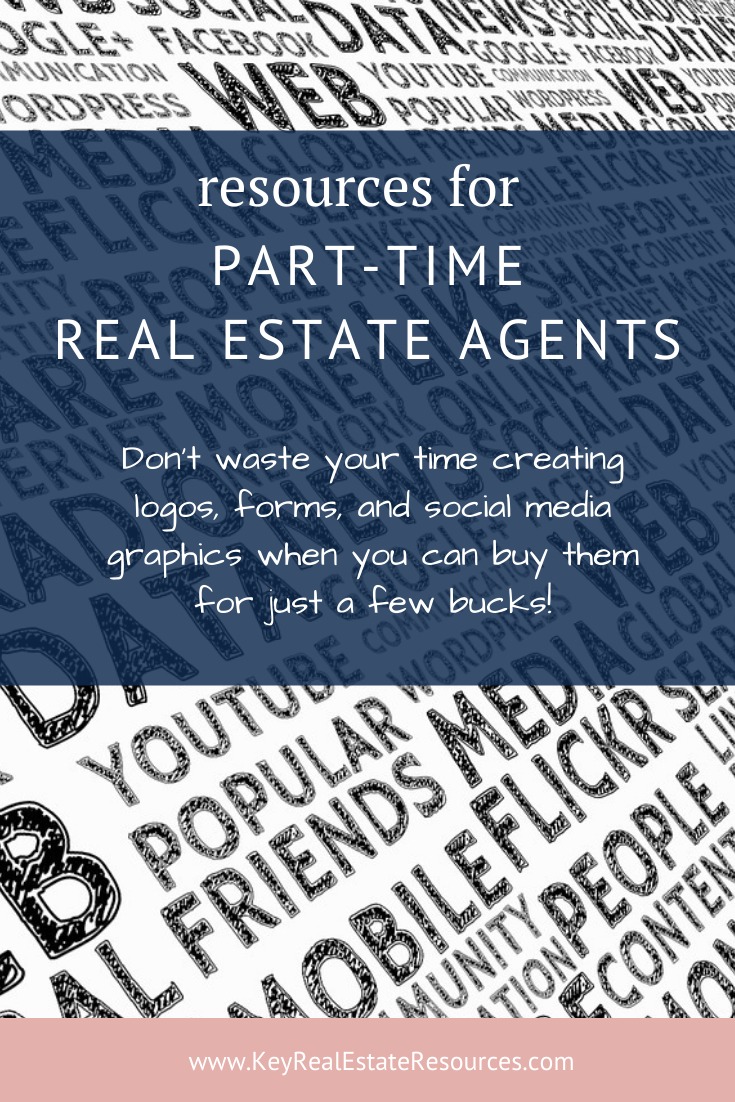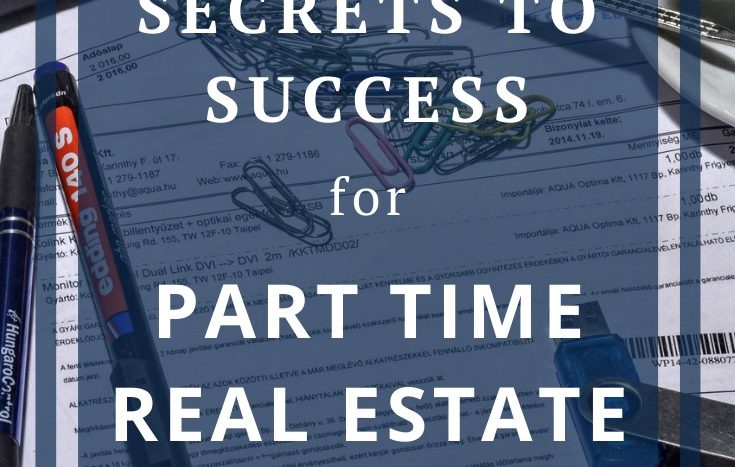Can you be successful in real estate as a part-time real estate agent?
General industry wisdom says that you need to be able to commit to real estate full-time to make a living. Becoming a real estate agent is like launching your own business. It takes a whole lot more time, strategy, and energy than most people realize. And since you don’t generally earn a paycheck until you close a deal, most industry insiders say you owe it to yourself to give real estate your all.
In an ideal world, sure, we’d all like to leap head-first into real estate. But that commission-based pay structure makes the leap difficult in the real world. Do you have enough money saved to support yourself for at least 3-6 months while you work on finding your first client and closing your first sale? Probably not. That’s why starting as a part-time real estate agent is so appealing. You can get your feet wet while having the safety and support of a consistent paycheck from your other job.
So if you’re hoping to find success as a part-time real estate agent, we’re here to help. Today we have 5 secrets to finding success as a part-time real estate agent.
Quick note: this post was originally published in 2019; here is the new and improved version!

5 Secrets to Success as a Part-Time Real Estate Agent
Let’s count ’em down!
5. Make a Plan to Transition to Full Time ASAP
Let’s not sugar-coat this; real estate is a full-time job. You might have to start as a part-time real estate agent because you can’t afford to go straight to full-time, but if you want real estate to be a career instead of a hobby, you need to transition to full-time ASAP!
Go into your part-time career with a solid plan to transition to full-time (a written business plan will help you lay out your steps so they’re clear and easy to follow). Here are a few tips to help with your transition plan.
Save as much money as possible from your consistent-income job
What if you could save up a nice little financial safety net from your current job so you could cover your living expenses while you build your real estate business? That would certainly take a lot of the pressure off!
Hold yourself to a strict budget, reducing expenses wherever possible so you can funnel a good chunk of your paychecks into your savings account. A good general rule of thumb for commission-only careers is to always have enough in savings to cover at least 3-6 months’ worth of expenses. Because even seasoned agents have dry spells every once in a while. If you have some savings to live on, you won’t have to stress when you hit a bit of a drought.
Build multiple income streams
What’s even better than building your savings? Building multiple streams of income!
There are so many ways to make money in real estate. Just check out our list of 55 Ways to Make Money in Real Estate! And many of those income streams perfectly complement your real estate career. They can even bring in new leads! Here are a few examples:
- Property Tax Appeal Services: I’m shocked at how few agents offer property tax appeal services (or even know what property tax appeals are!). In a slowing market, you can make a small fortune while providing real value to homeowners and simultaneously generating new listing leads.
- Property Management Services: The commissions on rental properties are lower, but they take a whole lot less time than selling real estate, and (in most cases) you get paid a whole lot sooner. You can even build a steady income by providing ongoing property management services to your investor clients. It just takes a little organization to stay on top of your portfolio, so make sure you invest in some inexpensive, but effective, property management software.
- New Home Photo Shoots: How’s this for a genius way to reach millennial buyers: offer professional photo shoots to new buyers! It’s like engagement photos but focused on the buyers in the home. You can take and edit the photos yourself or partner with a professional photographer for a share of the profits. Have your photography clients tag you when they post the photos all over social media, and you’ll be rolling in passive buyer referrals!
It might sound crazy to split your time between your current job and your job as a part-time real estate agent and add a new income stream. But since these income streams supplement your real estate business, they can be done simultaneously.
Or you could focus on building up one of these income streams first (since they typically cash flow faster than real estate transactions). Then, when the income stream is running efficiently, quit your job and focus on your real estate transaction business using the leads generated by your real estate-related income stream.
Set a deadline, and share your plan with your Broker
With these ideas in mind, set a realistic deadline for the day you’ll be able to quit your current job and transition fully to real estate. Document the steps you’ll need to take between now and then. Then share the plan with your Broker so you have someone to hold you accountable!
4. Prove Yourself to Clients and Prospects
Warning: clients and prospects will be a little leery of you when you’re a part-time real estate agent. They may have concerns that you aren’t as committed to the profession as the full-time agents. So you’ll need to work extra hard to prove yourself and earn their trust.
The quickest way to boost your perceived credibility is to launch a website. Having a profile page on your broker’s site shows that you work under that brokerage, but it doesn’t show buyers and sellers that you are an authority in your market. A real estate website of your own instantly legitimizes your business in the eyes of clients. And, believe it or not, it’s entirely possible to build your own website (you’ll save a small fortune compared to hiring a web designer or renting a cookie-cutter website).
Once your site is up and running, you can show off your market knowledge and real estate expertise with a real estate blog. There are several brilliant benefits to blogging, but this benefit is especially relevant for part-time agents who need to prove their worth to clients. You’ll be able to publish posts about the buying process, selling process, current market conditions, local real estate investing opportunities, and even fun posts about local events and businesses to show that you’re involved in the community.
Prospective buyers and sellers will see that you know your stuff and will have some level of trust in you before they even meet you! Check out Mastering Blogging for Lead Generation to learn more about turning this isn’t a serious marketing method.

3. Build Passive Lead Sources
You know what’s a hugely inefficient use of time? Cold calling.
Can you get leads from cold calling? Of course! But it may take several hundred calls. Is that worth your time? Especially when there are more efficient ways to reach prospective clients?
The real estate blog we just discussed is one passive option for generating leads. As you post more content on your site, Google indexes that content and can list your website in the search results when buyers and sellers Google terms like “how much does it cost to hire a real estate agent?” or “best neighborhoods in [your city].” It takes time to establish this lead source, but soon, you’ll be getting “come list me” calls from sellers who found you with Google!
Social media is another great way to reach multiple prospective clients at the same time. And each post is a marketing asset you can use multiple times. You can post the same images across all social media platforms, and even reuse seasonal posts year after year (while they’re still relevant and modern).
With cold calling, you have to spend the time to reach out to individual prospects, most of whom will have zero interest in your services. But with social media and blogging, you don’t have to find your needle-in-a-haystack clients. Instead of going to your prospective clients, clients start coming to you.
Blogging and social media go hand-in-hand. You publish a post on your blog, then you strategically share it on your social media accounts.
If you’re ready to start your blog, check out How to Crush Your First Blog Post. And check out DRIP for fresh social media posts and newsletters each month!
2. Focus on Sellers
It’s a whole lot more efficient to work with sellers than with buyers.
As anyone who’s ever worked with buyers knows, it’s entirely possible to invest hours, days, and even weeks in finding your buyers a suitable home…and then they may or may not buy from you. Some may decide to rent, some may decide not to leave their current house, and (worst case scenario) some use a family member as their agent to close the deal (this is why you want to get those exclusive buyer agreements signed asap!).
Sellers, on the other hand, are under a more stable contract with you as the listing agent. This contract provides some level of protection against wasted time and no paycheck.
Additionally, the time you do invest is more flexible with sellers. With buyers, you’re on their schedule. They can only see properties during their lunch breaks and Saturday morning? Better hope that doesn’t interfere with your other job!
But when you’re representing the seller, your primary task is marketing the property to buyers and their agents, which can generally be done on your own schedule. Sellers’ needs are simply less time-consuming and more flexible than buyers’ needs.
But you may need a buyer program too…
Having said that, it’s usually easier to land buyer clients than seller clients because, frankly, buyers don’t have to pay the agent since sellers cover real estate commissions. For an efficient buyer funnel, launch a Renter-to-Homeowner Program in your area (it’s easier than it sounds!).
1. Get help!
You can’t do everything all by yourself. Especially when you’re splitting your time. As a part-time real estate agent, you need a team of people supporting you.
- Your Broker: you need a Broker who is supportive of hiring you as a part-time agent and is committed to helping you succeed with your plan to go full-time.
- Your Real Estate Team: Many part-time real estate agents work as part of a real estate team. That way, someone from your team can provide a prompt reply to your clients when you’re busy with your other job. But be warned: the low man on the totem pole is usually assigned to buyers instead of sellers. That alone could delay your transition to full-time because it will likely take more time to close sales.
- Your Family and Friends: If you have lots of personal-life responsibilities (kids, aging parents, social commitments, etc), you might need to enlist friends and family to help out. Maybe you can lean more on your spouse to step up with the kids and the housework. Or you could ask a friend for help with that bridal shower you agreed to host. Don’t be afraid to ask for help with your personal commitments while you’re working two jobs!
In addition to getting support from the people in your life, take advantage of time-saving resources while you’re making the transition!
Many agents try to DIY everything. Their marketing materials, their forms, their website, their social media, their blog. All those things take serious time! Time that you don’t have if you’re a part-time real estate agent. Instead, take advantage of other people’s expertise and skill.

Etsy
Most agents don’t think of Etsy as a business vendor, but Etsy is a valuable source of business tools at a reasonable price. Before you waste your time trying to DIY everything, check Etsy to see if they have what you need:
The coolest part is that digital downloads are available instantly upon purchase. So you can post your social media graphics or print your open house forms immediately. No waiting for shipping! And they’re fairly inexpensive; you can get some designs for just a few dollars.
Fiverr
What if you need a custom job instead of purchasing a template from Etsy? Well then, head to Fiverr.
You’ll find freelancers on Fiverr who can handle almost any task you can throw at them. Just consider a few of the services you can get for as little as $5:
- Data entry
- A virtual assistant
- Logo design
- Content writing
- Business card design
- Social media posts
- Video and audio
- Website assistance
If you try to do everything yourself, it will take 10-20x longer, and you’ll burn yourself out. Spending even a little money upfront can save you hours of your life! Consider these business expenses when you’re making your budget and creating your transition plan.
Get a Small Win
Small wins lead to great victories! Before you move on with the rest of your day, get a small win…
Today’s small win challenge: outline your transition plan from part-time real estate agent to full-time real estate agent. Jot down how much money you need to have (either in the bank or via another income stream) before you’ll feel semi-comfortable making the leap. Document how you plan to make that money and how long it will take. Then get out there and hustle!
Get Your Complete Recession-Proof Guide!
If you’re serious about growing your real estate business during a slow market, check out The Recession-Proof Real Estate Agent. This book offers a complete step-by-step guide to recession-proofing your real estate business.












